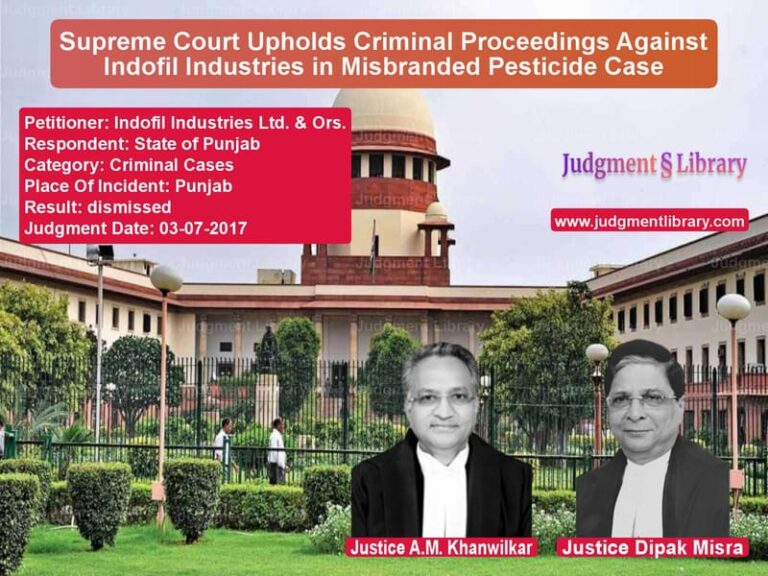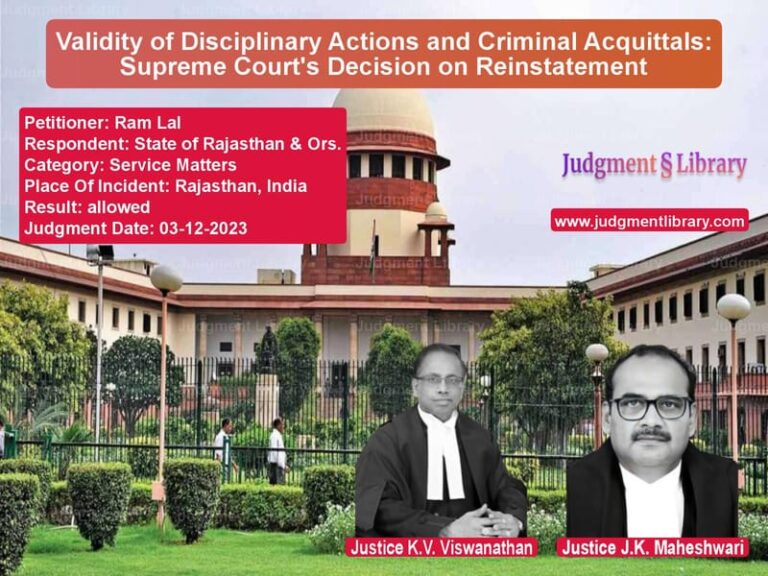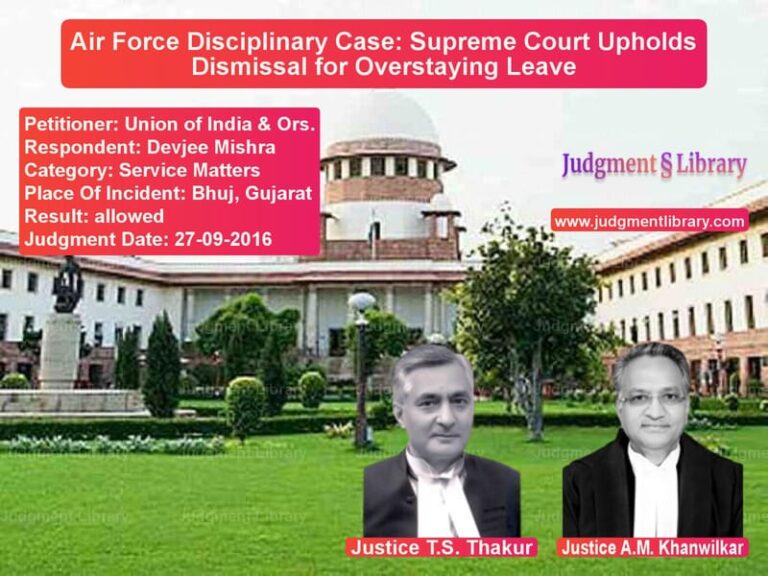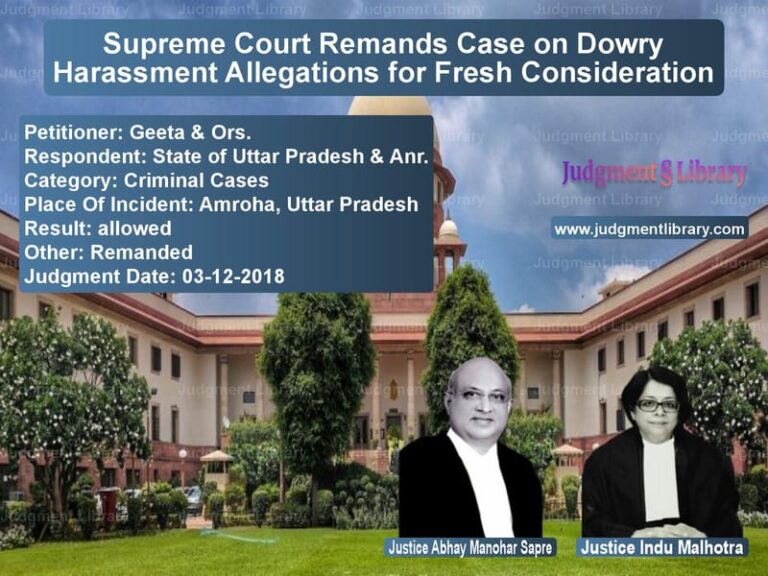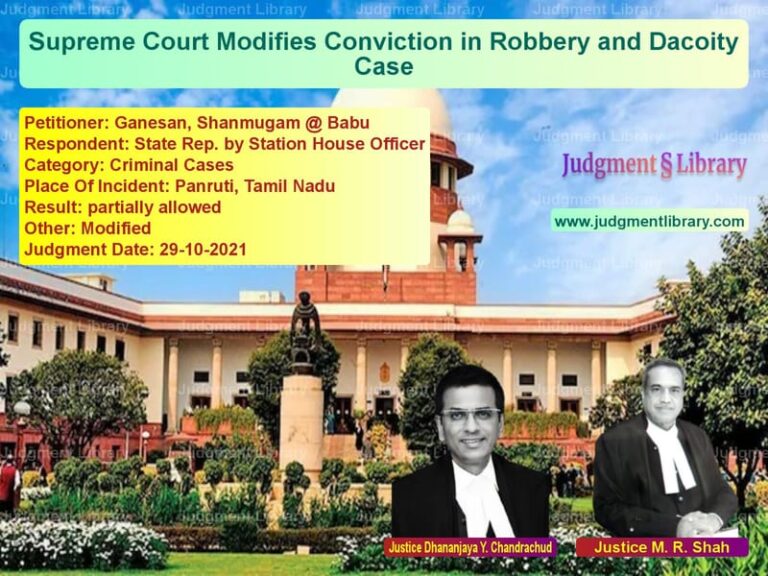Madhya Pradesh State Service Examination Dispute: Impact of Rule Amendments on Reservation Candidates
The recruitment process initiated by the Madhya Pradesh Public Service Commission (MPPSC) for filling 571 State service posts became the center of legal complexities due to a controversial amendment and subsequent withdrawal of rules governing the selection procedure. This litigation highlights the critical significance of administrative consistency and fairness in the recruitment processes, particularly affecting candidates from reserved categories who found themselves adversely impacted by the state’s policy changes.
Origins of the Controversy
The dispute arose from the MPPSC’s recruitment notification issued on 14 November 2019, under the Madhya Pradesh State Service Examination Rules, 2015 (‘Rules of 2015’). The preliminary examination was conducted on 12 January 2020, with over 3 lakh aspirants participating. However, complications arose shortly thereafter due to an amendment to Rule 4 of the Rules of 2015 on 17 February 2020.
Rule 4: Original vs. Amended Version
Initially, Rule 4 mandated that candidates from reserved categories who scored high enough to qualify in the general category without availing reservation benefits were to be clubbed with the unreserved candidates at the preliminary stage itself. The original rule clearly stipulated:
“Rule 4. Mode of preparation of select list. (1)(a)(i) On the basis of marks obtained in Preliminary Examination, candidates numbering 15 times the vacancies as advertised category wise will be declared successful for Main examination subject to the condition that candidates have scored minimum passing marks as may be specified by the Commission. In addition to this, all the other candidates who get marks equal to ‘Cut Off Marks’ will also be declared successful for the main examination.”
The Controversial Amendment
The amendment enacted on 17 February 2020 drastically altered the process by directing the segregation and adjustment of reservation category candidates with the general category only at the final selection stage. Specifically, amended Rule 4(3)(d)(III) stated:
“Candidates of reserved category (Scheduled caste/Scheduled Tribe/Other Backward Classes/Economically Weaker Section) who get selected like general category candidates without any relaxation shall not be adjusted against the posts reserved for those reserved categories. They shall be adjusted against vacancies of unreserved category. But above adjustment will only be at the time of final selection, not at the time of preliminary/main examination.”
Petitioners’ Main Arguments
Aggrieved by this change, several candidates approached the Madhya Pradesh High Court, raising concerns that applying the amended rules retrospectively to an ongoing recruitment process was fundamentally unjust. They contended that:
- The retrospective application of amended Rule 4 unfairly disadvantaged meritorious reservation category candidates.
- This led to qualified candidates being improperly classified within reservation categories, thereby denying rightful opportunities to other deserving candidates.
Respondents’ Arguments
In defense, the MPPSC and the State argued that the amended rules were procedural, intending fairness at the final selection stage, and not detrimental to candidates as claimed by the petitioners.
High Court’s Critical Observations and Ruling
The High Court, examining these petitions, ultimately declared amended Rule 4(3)(d)(III) ultra vires, setting it aside for causing prejudice to meritorious reservation candidates who could otherwise compete in the open category at preliminary stages. The High Court emphasized that reverting to the original rules was necessary to uphold fairness in the selection process.
The Court thus directed:
- Conducting a special main examination only for candidates affected by the improper application of amended rules.
- Merging and normalizing results from both the original and special main examinations, adopting a fair and transparent normalization process.
Normalization Process Explained
The normalization procedure, explained by experts to the court, aimed to equitably integrate results from both examinations. This approach, supported by expert advice, ensured comparability and fairness among candidates appearing at different stages.
The Supreme Court, appreciating the expert testimony, affirmed:
“We are fully satisfied that a transparent process, completely above board, was adopted to bring all candidates onto an even platform so as to finalize the list of candidates eligible to be interviewed.”
Key Observations by the Supreme Court
The Supreme Court bench comprising C.T. Ravikumar and Sanjay Kumar critically examined the procedural aspects, noting the significant adverse impact on reservation candidates under amended Rule 4(3)(d)(III):
“Rule 4(3)(d)(III) patently harmed the interests of the reservation category candidates, as even meritorious candidates from such categories, who had not availed any reservation benefit, continued to occupy reservation slots, which would otherwise have gone to deserving reservation candidates lower down in the merit list.”
Final Decision by the Supreme Court
Upon thorough analysis, the Supreme Court dismissed the appeal, endorsing the High Court’s directive for merging and normalizing the two separate main examinations. Highlighting judicial restraint and technical expertise, the Court concluded:
“The judgment of the Division Bench does not brook interference on any ground, be it on facts or in law. The normalization and merger approach adopted was transparent, justified, and in accordance with the law.”
Significance and Broader Implications
This decision underscores the necessity of procedural fairness and clarity in public service recruitments. It serves as a cautionary reminder against arbitrary rule changes mid-way through recruitment processes. The Court reinforced the importance of uniform and fair standards, especially when affecting aspirants from various backgrounds and categories, thus protecting equitable participation and transparency in public employment.
Petitioner Name: Deependra Yadav and others.Respondent Name: State of Madhya Pradesh and others.Judgment By: Justice Sanjay Kumar, Justice C.T. Ravikumar.Place Of Incident: Madhya Pradesh.Judgment Date: 01-05-2024.
Don’t miss out on the full details! Download the complete judgment in PDF format below and gain valuable insights instantly!
Download Judgment: deependra-yadav-and-vs-state-of-madhya-prad-supreme-court-of-india-judgment-dated-01-05-2024.pdf
Directly Download Judgment: Directly download this Judgment
See all petitions in Employment Disputes
See all petitions in Recruitment Policies
See all petitions in Public Sector Employees
See all petitions in Promotion Cases
See all petitions in Other Cases
See all petitions in Judgment by Sanjay Kumar
See all petitions in Judgment by C.T. Ravikumar
See all petitions in dismissed
See all petitions in supreme court of India judgments May 2024
See all petitions in 2024 judgments
See all posts in Service Matters Category
See all allowed petitions in Service Matters Category
See all Dismissed petitions in Service Matters Category
See all partially allowed petitions in Service Matters Category


